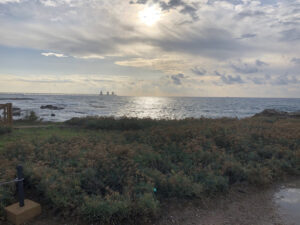Photo by Rabbi Susan Elkodsi
Va’Etchanan: Rav Lach, It is enough for you
Rabbi Janet Madden, Ph.D
Parshat Va’Etchanan opens with Moshe’s recounting to the new generation of Israelites that he pleaded with the Holy One to allow him to enter the Land of Israel. He shares the response: “rav lach—it is enough for you.” And before he goes on to provide a recap of three of the most important moments of the Israelite journey—the giving of the Ten Utterances, the Shema and the redemption from slavery in Egypt—Moshe concludes his opening anecdote by stating that after the Divine response that he has had enough, Moshe is instructed to ascend a mountain and gaze into the Land that he will never enter.
What a poignant, arresting image: at the end of his long life in service to the Holy One? And to the Israelite people? Moshe holds the knowledge that he will die without completing his journey, and that when he begs for more, he is told that he has enough, not what he lacks.
I subscribe to the mystical belief that Va’Etchanan, my birth parasha, contains specific lessons for my life. When I was young, I found essential and sustaining guidance in what I think of as the trifecta of the three seminal moments mentioned above. And I still do. But now, I see the words of the Holy One, “rav lach—you have enough,” as the great teaching for an awareness that will guide me through the final chapters of my life.
For a while now, and especially since the deaths of my parents, my birthday celebrations have been tempered with the knowledge that more of my life is behind me than ahead of me. I see changes when I look in the mirror, and I realize that some physical task or another isn’t as easily accomplished as it used to be. The last decades have taught me much about loss as the circle of loved ones into which I was born and that I cultivated in childhood, adolescence and beyond has shifted as family elders, mentors, role models, friends and colleagues have died. And in those same years, children have grown and married and grandchildren have come into the world. My loving and supportive partner and I have seen each other through grief, joys and challenges. I have made new and wonderful friends. I have had personal and professional opportunities that I never imagined. My spiritual life has deepened. My creativity has blossomed in surprising ways. I know that I am richly blessed and strive to live and embrace that knowledge.
It’s so tempting to constantly wish for more than we have. But the lesson of “rav lach—it is enough for you” is that no one, not even one who speaks face-to-face with the Divine, can have everything that we hope for, even when we think that we have earned it, that we deserve to have it. “Rav lach—it is enough for you” reminds us that we are limited in so many ways, particularly in terms of time, that precious and un-renewable resource. Like Moses, each of us looks into the future knowing that, at some moment, we will fully receive the message “rav lach—it is enough for you” and the future will continue to unfold, but without us.
Kohelet Rabbah 1:34 tells us that “No one departs from this world with half his cravings satisfied.” While we are in this world, it’s good to focus on continuing to grow. And, for me, it’s important to hear the Divine words “rav lach—it is enough for you” as a reminder that living in fullness means living in discernment and gratitude, that seeking meaning and joy in every aspect of life makes my life more likely to be filled with holiness and wholeness.
Psalm 90:12 asks “Teach us to count our days rightly, that we may obtain a wise heart.” For me, the great response to the plea for more is “rav lach—it is enough for you.” These words encourage me to strive to make my days count and to treasure relationships and experiences and to have the wisdom to accept limitations and disappointments. They encourage me to balance the knowledge I do not have infinite time with gratitude for the time that I have.
Rabbi Janet Madden, PhD received rabbinic ordination from The Academy for Jewish Religion-California. A widely-published writer and frequent conference presenter, she is Rabbi of Fountainview at Gonda Westside, serves congregations in Malibu and O’ahu, is Rabbi of Saint John’s Medical Center and provides Spiritual Direction to rabbinic students at HUC-LA. A member of the Board of Governors of the Sandra Caplan Community Bet Din of Southern California, she also serves as adjunct faculty of Kavod v’Nichum’s Gamliel Institute. She holds certification in Jewish End of Life practices through the Gamliel Institute, completed 4 units of CPE, is a certified Jewish Spiritual Director and trained in Jewish Sacred Chant, and earned a Rabbinic Certificate in Gerontology and Palliative Care from the Wurzweiler School of Social Work at Yeshiva University. Licensed as an attorney through the Federal Maritime Commission, she received a Fulbright Teaching Fellowship and is a three-time research fellow of the National Institute for the Humanities. Her earned doctorate in literature was granted by the National University of Ireland.











0 Comments